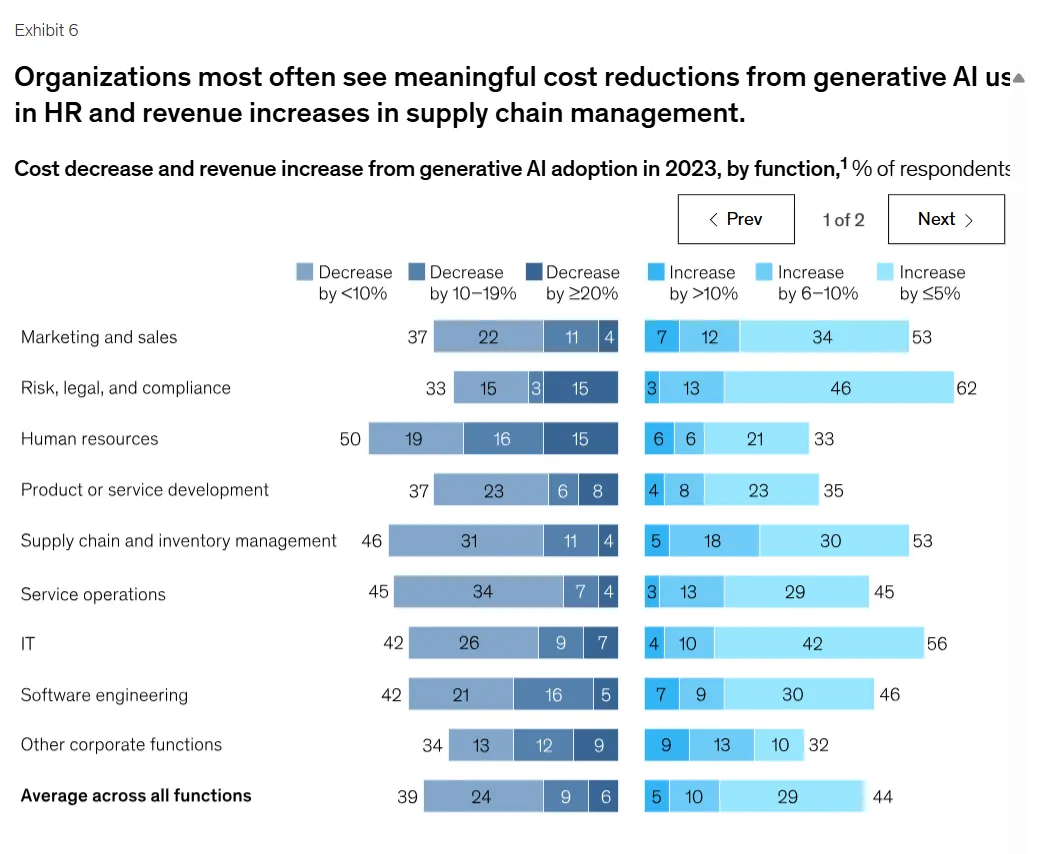Global AI Adoption Reaches 72%, Generative AI Use to Double by 2024: Report
7 months ago Benito Santiago
More than seven in 10 businesses and organizations worldwide are using artificial intelligence, according to a new study by global management consulting firm McKinsey, a significant increase from the roughly 50% adoption rate seen a year ago.
In a survey of more than 1,363 respondents, 72% of their organizations have adopted some form of AI in at least one business function, and 65% said their organizations are using generative AI on a regular basis – double the rate of 33% in 2023.
The impact of AI and generative AI extends across borders and industries. Last year, the adoption of AI did not exceed 66% in any part of the world, but this year, more than two-thirds of respondents in all regions reported that their companies are using AI – the largest increase in the Asia-Pacific region and China.
The study received responses from 1,363 participants in an online survey conducted in early 2024, the results of which were released last week. According to McKinsey, the data set can represent entire regions, industries, company sizes, functional specialties and holdings. To adjust for differences in response rates, McKinsey weighted the data by each respondent's population contribution to global gross domestic product (GDP).
Last year, McKinsey published a report, “Generative AI could add $2.6 trillion to $4.4 trillion annually to the global economy.” This equates to 15 to 40 percent of the total economic impact of artificial intelligence.
While AI, or artificial intelligence, is a broad term that encompasses a variety of technologies designed to mimic human intelligence, Generative AI is a specific subset of AI that focuses on creating new content. Traditional AI systems often analyze and interpret data, make decisions and solve problems based on previous information. But Generative AI uses deep learning techniques to generate new data that mimics the training dataset. This can include creating text, images, music, and limited 3D worlds.
Broken down by industry, the biggest increase in AI use has been in professional services, including human resources, legal services and management consulting, where organizations are harnessing the power for repetitive tasks in areas that require human interaction.
“The average organization using Gen AI is working across two functions: marketing and sales and product and service development,” the study says. In sales alone, the use of generative AI has doubled since last year.
The use of AI has matured, reports McKinsey: Organizations are now more involved in mitigating its risks—especially in terms of fraud and intellectual property infringement. The number of respondents who said it was wrong went up from 56 percent to 63 percent. Manpower and labor displacement is a concern and has decreased from 34% to 27%.
Of the risk categories surveyed, respondents were least concerned about environmental impact, political stability, and physical security.
Perhaps unsurprisingly, McKinsey says AI adoption is boosting the company's bottom line.
“Respondents mostly report meaningful revenue increases of more than 5% in supply chain and inventory management,” the study says.

According to the research, many organizations are not only using off-the-shelf AI solutions, but are also customizing them or developing their own proprietary models. This trend toward customizing AI technologies to meet specific business needs and gain competitive advantage is particularly prevalent in industries with high public participation, according to McKinsey.
“Respondents in energy and materials, technology, and media and telecommunications are more likely to report significantly customizing or modifying publicly available models or developing their own proprietary models to meet specific business needs,” the report said.
The study showed a significant increase in the use of generative AI in work and personal life compared to last year. With the explosion in popularity of tools like ChatGPT, MidJourney and Stable Diffusion, people are using generative AI beyond business, simulating entertainment, education and social interactions.
For McKinsey, AI is more than a motivation or a business trend. Generative AI is proving to be a business-changing technology.
“If 2023 is the year the world discovers generative AI, 2024 will be the year organizations start to really use this new technology and see commercial value,” the report concluded.
Edited by Ryan Ozawa.
Generally intelligent newspaper
A weekly AI journey narrated by General AI Model.













